The Xichengyi culture (Ch:西城驿文化) was an ancient culture in the central Heihe River region of the Hexi corridor, from 2,000 to 1,600 BCE.[2] It is contemporary with the Qijia culture to its southeast. It succeeded the Majiayao culture (2,300–2,000 BCE) in the area, and preceded the Siba culture.[1]
| Geographical range | Gansu, China |
|---|---|
| Dates | 2,000-1,600 BCE |
| Major sites | Xichengyi, Ganggangwa, Huoshiliang |
| Preceded by | Majiayao culture (3,300–2,000 BCE) |
| Followed by | Siba culture (1,600–1,300 BCE)[1] Shajing culture (800–200 BCE)[1] Han Dynasty (202 BCE–220 CE)[1] |
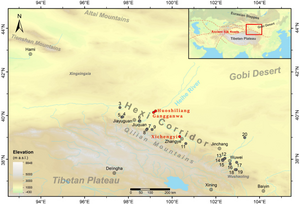
Some of its important archaeological sites are Xichengyi, Ganggangwa (where there are also some earlier Machang culture remains), and Huoshiliang (exclusively Xichengyi culture).[2]
The Xichengyi culture practiced bronze smelting extensively, as seen by the quantity of slabs and furnace material (adobe constructions with blast pipes).[3] The copper ore was from the neighbouring Beishan Mountain.[3]
References
edit- ^ a b c d Li, Xin; Wei, Wenyu; Ma, Minmin; Lu, Minxia; Du, Linyao; Yang, Yishi; Chen, Guoke; Ren, Lele (2023). "Transformation of animal utilization strategies from the late Neolithic to the Han Dynasty in the Hexi Corridor, northwest China: Zooarchaeological and stable isotopic evidence". Frontiers in Earth Science. 10. Bibcode:2023FrEaS..1064803L. doi:10.3389/feart.2022.1064803. ISSN 2296-6463.
- ^ a b Qiu, Menghan; Li, Haoran; Lu, Minxia; Yang, Yishi; Zhang, Shanjia; Li, Ruo; Chen, Guoke; Ren, Lele (2022). "Diversification in Feeding Pattern of Livestock in Early Bronze Age Northwestern China". Frontiers in Ecology and Evolution. 10. doi:10.3389/fevo.2022.908131. ISSN 2296-701X.
- ^ a b c d Chen, G.; Cui, Y.; Liu, R.; Wang, H.; Yang, Y.; Pollard, A. M.; Li, Y. (October 2020). "Lead isotopic analyses of copper ores in the Early Bronze Age central Hexi Corridor, north‐west China". Archaeometry. 62 (5): 952–964. doi:10.1111/arcm.12566. hdl:21.11116/0000-0006-0FF7-4. S2CID 216443994.
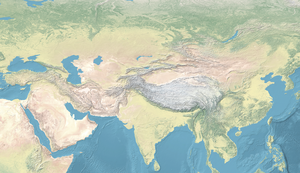
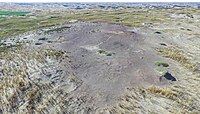
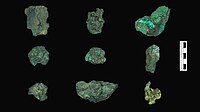
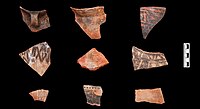
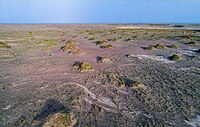
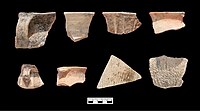
![Xichengyi adobe building and bronze slabs.[3]](http://up.wiki.x.io/wikipedia/commons/thumb/6/65/Xichengyi_adobe_building_and_bronze_slabs.png/200px-Xichengyi_adobe_building_and_bronze_slabs.png)
![Xichengyi blast pipes.[3]](http://up.wiki.x.io/wikipedia/commons/thumb/c/ce/Xichengyi_blast_pipes.png/200px-Xichengyi_blast_pipes.png)